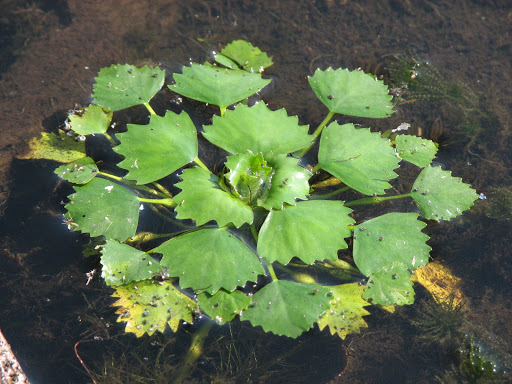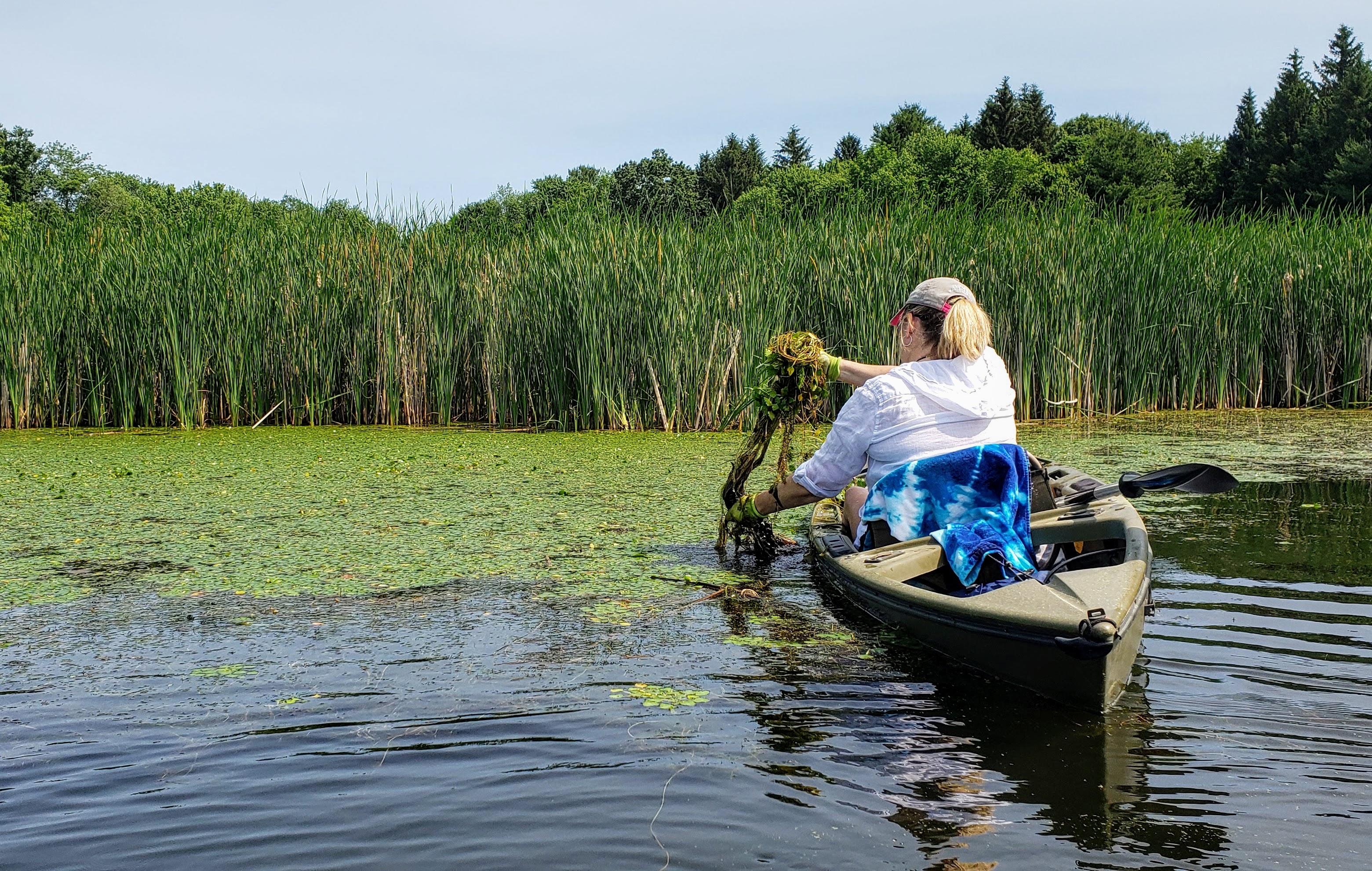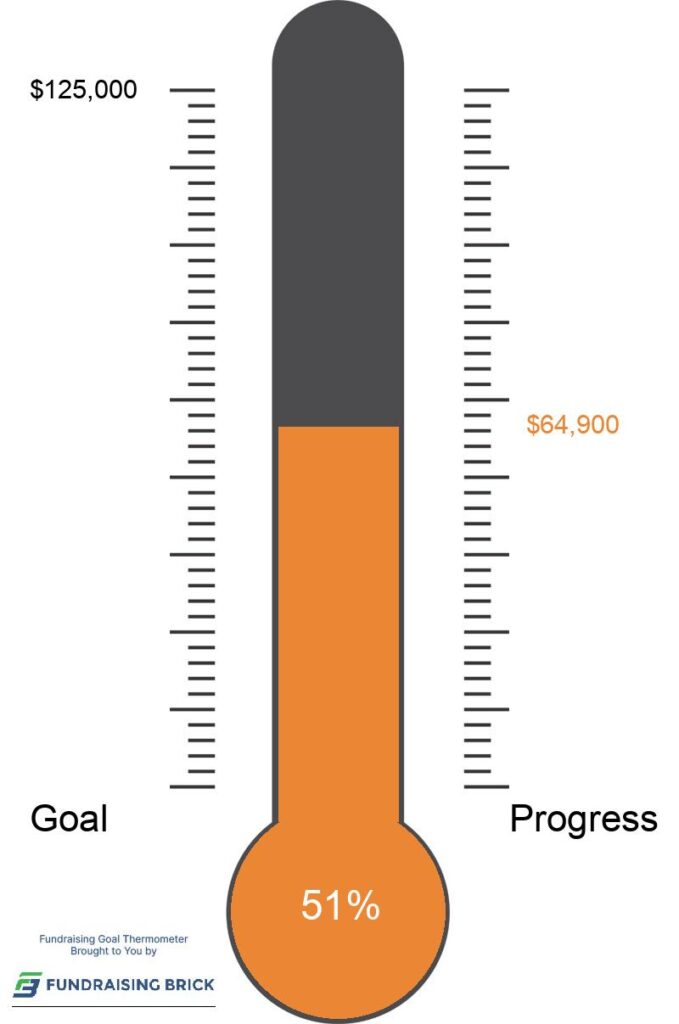Due to this year’s ProcellaCor treatment that appears to have eradicated most of the Eurasian milfoil in the lake, the EcoHarvester was only used to harvest water chestnuts. Since most of the water chestnuts reside in shallower water at the north end of the lake, the harvester was easily able to pull them out with their roots well before the nutlets had a chance to grow. About 1 acre of water chestnuts was harvested on July 7th in accordance with our DEC permit.
**WARNING**
Kinderhook Lake will be treated with ProcellaCor,
an aquatic herbicide used for the control of Eurasian milfoil
Tuesday, June 22, 2021
NO SWIMMING or BOATING
is permitted on the day of the treatment
NO IRRIGATION or LIVESTOCK WATERING
is permitted until herbicide concentrations are tested below 1ppb,
expected approximately 7 days after the treatment
Treatment notifications will be posted 24 hours prior to the treatment date
and removed when concentration levels are acceptable for irrigation,
expected approximately 7 days following the treatment date
Note: ProcellaCor will be applied by an airboat with weighted sub-surface drag-lines
As we move into June, we can see that the Eurasian milfoil is flourishing all around the lake. This is actually a good thing because ProcellaCor is most effective when milfoil is in full growth mode; it will allow the plants to better absorb the herbicide all the way down to the roots. Our DEC permit application has already been approved and, weather permitting, we hope to be treating the milfoil with ProcellaCor during the third week of June. For those of you not aware of what we are up to, please see our 14 January 2021 post below.
During a pre-treatment weed survey of the lake in early May, an additional 46 acres of milfoil were identified by Burden Aquatics, expanding the milfoil beds from 160 acres to over 200 acres. DEC has already amended our permit to include the additional acreage as it is critical that we address this issue now before it gets even worse.
Although ProcellaCor is absorbed by the milfoil within the first 3-6 hours after treatment, it will take weeks to see evidence of the results. Here is what you can expect to see.
- One week after treatment, the plants should still be standing but may look sad and begin to wilt.
- At the end of week 2, half the plants may still be standing but will have turned brown and brittle.
- By the end of week 3, most of the plants (but not all) will have fallen to the bottom of the lake.
- By the end of week 4, it will be difficult to detect any evidence of the plants.
A couple of things to be aware of, (1) milfoil that has not germinated at the time of the ProcellaCor treatment will not be affected and growth may begin later in the summer, and (2) milfoil fragments, whether floating or within the water column, will likely not be affected by the ProcellaCor treatment and may start new growth later in the season or next year. If you see weeds floating around your dock or shoreline, please try to remove them from the lake to reduce the potential of them starting new plant growth.
The treatment date will be posted on the KLC Facebook page as well as on our website as soon as it is confirmed. As required by DEC, signage will be posted around the lake 24-hours before the treatment date. As a reminder, there will be an irrigation restriction for up to 5-days after the treatment and a swimming restriction on the day of the treatment.
Although there are no other legal restrictions, we ask that all boats stay off the lake the day of the treatment. Boating activity will cause additional water movement that may disperse and dilute the herbicide and potentially make it less effective.
We are proud to say that our members have been very generous this year and we have almost reached our goal to raise the $70,000 needed to treat the original 160 acres. However, treating the extra 46 acres identified this spring will cost an additional $20,000, so we are raising our fundraising goal to $90,000. We ask those of you who have not yet donated to the ProcellaCor Fund to please consider doing so now. We also ask those of you who have already donated to please consider an additional donation to help offset the cost of treating the additional acreage. For donation information, please click the link at the top of this page or in the right-hand column.
Remember, based on the reported experience at other lakes, this ProcellaCor treatment should be effective for up to three years. While the lake will never be 100% weed-free, we can look forward to many years of boating and recreational activities not hampered by enormously thick beds of milfoil.
As most lake users are aware, 2020 was a rough year for management of aquatic invasive species (weeds) on Kinderhook Lake. Dense beds of Eurasian Watermilfoil prevented boating and other recreational activities from taking place in large areas of the lake. We were not alone, as similar instances of expansive weed growth in 2020 were reported in many other lakes throughout the region.
Back in 2016, close to 75-acres of aquatic invasive species, primarily Eurasian Watermilfoil, were mapped in the lake. That process led to the purchase of the Eco-Harvester in 2017, which has been efficiently removing milfoil each summer in the main boating channels as allowed by our DEC permit. Since then, the invasive weed beds have expanded, almost doubling in size and density by 2020. Contributing factors to the unprecedented increase in weed growth include (1) recent warmer winters not allowing sediment to freeze deep enough to kill or stun weeds in areas exposed by the annual drawdown; (2) unusually good water clarity consistently 6- to 7-feet deep for the last few years, allowing the sun to reach deeper and help spur weed growth; (3) the natural cycle of aquatic plant decay contributing to rich nutrients helping to fuel weed growth; (4) constant fragmentation of weeds from boat propellers traveling through the milfoil beds (milfoil easily propagates by fragmentation); and (5) natural reseeding and root expansion from large milfoil beds left unharvested due to limitations of our DEC harvesting permit.
While the Eco-Harvester removed a record 118 harvester-loads of invasive weeds this past summer (volume equivalent to ~413 cubic yards or ~34 dump truck loads), it could not keep up with the thick and speedy regrowth of milfoil. Evaluation throughout the summer and fall led the KLC Weed Committee to determine that it was time to expand our weed management program to include new options to combat aquatic invasive species in addition to using our Eco-Harvester.
After extensive research, the Weed Committee identified a relatively new aquatic herbicide called ProcellaCor. It has been used in many states for several years with remarkable results but was only approved for use in New York State waterbodies in 2019. Weed Committee members visited two local lakes in Fall 2020 to observe the results of their ProcellaCor treatments. Areas of milfoil treated with ProcellaCor at Crooked Lake in Fall 2019 and Burden Lake in Spring 2020 were completely free of milfoil. Committee members talked with several other lake associations that used ProcellaCor in recent years and the results were equally as impressive—no regrowth of milfoil. Committee members also consulted with the Department of Environmental Conservation (DEC) and several lake management firms licensed to apply ProcellaCor to evaluate the most optimal methods of treatment for Kinderhook Lake.
According to research, ProcellaCor has many important advantages over other widely used herbicides: (1) it is highly effective at extremely low dosages and dissipates quickly after use; (2) it specifically targets Eurasian Watermilfoil and a few other invasive species; (3) it does not harm native vegetation or wildlife; (4) it has minimal water use restrictions (primarily irrigation related); and (5) it reportedly lasts for three years before retreatment may be necessary (other herbicides require annual treatments). ProcellaCor treatments appear to be our best option to provide extended control of milfoil for several years.
Based on recommendations by the Weed Committee, the KLC Board of Directors approved the treatment of all milfoil in the lake with ProcellaCor in 2021 based on available funding. The KLC has since accepted proposals from three lake management firms and selected Burden Aquatics, Inc., a local firm from Averill Park, to prepare and submit DEC permit applications and treat the lake’s milfoil beds with ProcellaCor in June of 2021. The estimated cost to treat up to 160 acres is $70,000. The final cost will be determined by a survey in the spring to verify the exact size of all the milfoil beds.
Once the milfoil is treated with ProcellaCor, other weed species may eventually grow in its place. New growth could be native or invasive. For instance, curly-leaf pondweed already grows within many of the milfoil beds and will not be affected by the ProcellaCor treatments. It is possible that curly-leaf pondweed will thrive once the milfoil is treated. Fortunately, curly-leaf pondweed prefers cooler water and dies back on its own once the lake warms up by early-July and, until then, the Eco-Harvester will keep main boating channels clear as allowed by our DEC harvesting permit.
Recent capital improvements at the dam ($68,000 in 2019-2020) and annual copper sulfate purchases to help control blue-green algae (~$15,000/year) have put a considerable strain on the KLC’s financial reserves. However, this could not have been accomplished without your membership gifts and generous donations.
Your help is now needed to expand our weed management program. The goal is to raise $70,000 to treat up to 160 acres of Eurasian Watermilfoil with ProcellaCor during the summer of 2021. This goal can only be achieved through donations by everyone who loves and uses Kinderhook Lake and wants to see it thrive in the future.
To reach this goal, help save our lake from being overtaken by weeds, and expand our weed management program this coming spring, your support and donations in one of the following seven categories is requested:
| Silver | $50 – $199 | Eagle | $750 – $999 |
| Patron | $200 – $499 | Golden Eagle | $1,000 – $1,499 |
| Golden Patron | $500 – $749 | Diamond | $1,500 – $2,499 |
| Platinum Leader | Over $2,500 |
Donations can easily be made securely online here on our website or by sending a check to the KLC at PO Box 53, Niverville, NY 12130. Please see this pledge form for other donation options.
Think about it this way, ProcellaCor treatments are reported to last at least three years. If you donate $750, your one-time Eagle donation would be equivalent to $250/year. Certainly, you would agree that it is worth $250/year to save our lake from the destruction that will be caused by the continued expansion of Eurasian Watermilfoil. And, if you are lucky enough to own property on the lake, you would also agree that it’s worth $250/year to assure your property values continue to rise.
Thank you for your continued support and help to preserve Kinderhook Lake! Together, we can address this issue.

2020 has been a rough year for management of aquatic invasive species on Kinderhook Lake, especially Eurasian milfoil. Nobody can be sure if this is due to recent warmer winters not allowing sediment to freeze deep enough to kill or stun weeds in areas exposed by the drawdown, the unusually good water clarity consistently 6- to 7-feet deep for two years, the constant fragmentation of weeds from boat propellors traveling through the milfoil beds, or perhaps all of these combined. What we can be sure of is that we need to address this issue with new tools in addition to using our Eco-Harvester. While our harvester collected a record amount of milfoil this year, it was unable to keep up with this summer’s explosive weed growth in the areas that harvesting is permitted by our DEC permit.
For the past several months, the KLC weed committee has been hard at work researching new options to enhance our weed management program. Committee members have had numerous discussions with DEC, three lake management firms, and several local lake associations dealing with similar issues. Through this research we have found a relatively new herbicide that specifically targets Eurasian milfoil and has been used in many lakes throughout the country for the past few years. This herbicide does not appear to harm native weeds and comes with far fewer restrictions than any other herbicide in use today. Results of these treatments have been highly successful, showing no milfoil growth the second year after use. Committee members made site visits to two local lakes that have used this herbicide in 2019 and 2020 and personally observed the positive results; in one case, native weeds have already started to emerge where milfoil used to grow.
You will be hearing more over the winter about the upcoming changes to our weed management program as we continue to research and evaluate this new option. In the meantime, if you can’t wait for further updates, feel free to Google “ProcellaCor”.
This past Saturday, June 27th, volunteers once again helped to hand pull invasive water chestnuts. It is a somewhat messy job, but we are so very thankful for the two dozen volunteers who came out to help:
Molly Ashford, Sarah Ashford, Ken Bosen, Patty Bosen, John Bruford, Jennifer Clark, Vaughn Clark, Bill Cleary, Teri Cleary, Ryan Haney, Ron Jensis, Bernie Kelleher, Melonie Langdon, Dan Langer, Robin Langer, Linda Leader, Rosemary Palella, Jeanette Palella, Erik Piecuch, Paul Poux, Lisa Rich, Briggette Roos, Fran Sindlinger, Bridgette Tom. Sorry for any incorrect or misspelled names.
More photos can be found on the GALLERY page.
Volunteers have been hand-pulling water chestnuts at the north end of Kinderhook Lake for years and it has been paying off through a reduction in the weed beds. But we cannot take our foot off the pedal now. To continue to reduce the spread of this aquatic invasive species, this year’s water chestnut hand-pulling event is planned for Saturday, June 27, 9:00 am – 11:00 am. Volunteers are needed.
Please meet at the north end of the lake in your kayak, canoe, rowboat, raft, or any vessel that can navigate very shallow water. Don’t forget heavy gloves and perhaps a rake. A few teams of volunteers may be dispersed to various coves around the lake where new water chestnut growth has been identified. Pulled weeds will be transferred to the ECO-Harvester and brought to shore for disposal. In the event of pouring rain or lightning, the ‘pull’ will take place at the same time on Sunday, June 28. Some light refreshments may be available. Check here or on Facebook for any potential changes.
Saturday, June 22, 9:00am. Volunteers assembled at One Tree Island to start this year’s water chestnut hand pull event. Volunteers traveled up the west side of the lake along Ottoville Rd picking up hundreds of water chestnut “stragglers,” then entered the north end of the lake for two hours of pulling in the dense weed bed which, by the way, has receded about 50-feet further back due to the last few years of weed pulls. Once again battling this invasive species, an estimated four to five cubic yards of weeds were collected and removed from the lake. Thanks to all the volunteers who spent just a few hours helping to improve the quality of Kinderhook Lake: Melanie Langdon, Eric Piecuch, Doug Peterson, Tina Decker, Linda Leader, Bonnie Bargstedt, Ron Jensis, Dan and Robin Langer, Pete Walkes, Rick Theriault, Fran Sindlinger, John Bruford. If we forgot or misspelled any names, please forgive us and know that your time and assistance was greatly appreciated.
To help reduce the spread of this aquatic invasive species, a water chestnut hand-pulling event is planned for Saturday, June 22, 9:00 am – 11:00 am. We need two dozen volunteers for this event to be successful. Please meet at ONE TREE ISLAND with your kayak, canoe, rowboat, raft, or any vessel that can navigate very shallow water. Don’t forget heavy gloves and perhaps a rake. A few teams of volunteers will be dispersed to various coves around the lake where water chestnut growth has been identified. Pulled weeds will be transferred to the ECO-Harvester and brought to shore for disposal. In the event of pouring rain or lightning, the ‘pull’ will take place at the same time on Sunday, June 23. Please come and be part of the solution.
This year, some of the water chestnuts will be pulled with the ECO-Harvester. However, due to the risk of damage to the harvester drum, the harvester cannot run in the very shallow water where many of the water chestnuts are growing.
Kinderhook Lake has been selected for study by a student in the Professional Science Master’s Lake Management Program at the State University of NY at Oneonta. This is the only Lake Management degree program in the US. Over the course of one year, Amanda Setteducate will study and evaluate the lake’s water quality and nutrient levels, invasive species, watershed, and issues important to the lake community. It is expected that the study will result in a report that will provide recommendations for implementation of future lake management efforts. The KLC Board of Directors and Water Quality Committee is excited to work with Amanda and is looking forward to receiving assistance from her and the Lake Management program.
You can read more at Lake Management Graduate Program. If you have any questions about the Program or what Amanda will be doing at Kinderhook Lake, you can contact her at settan29@oneonta.edu.


























Follow Us on Facebook!